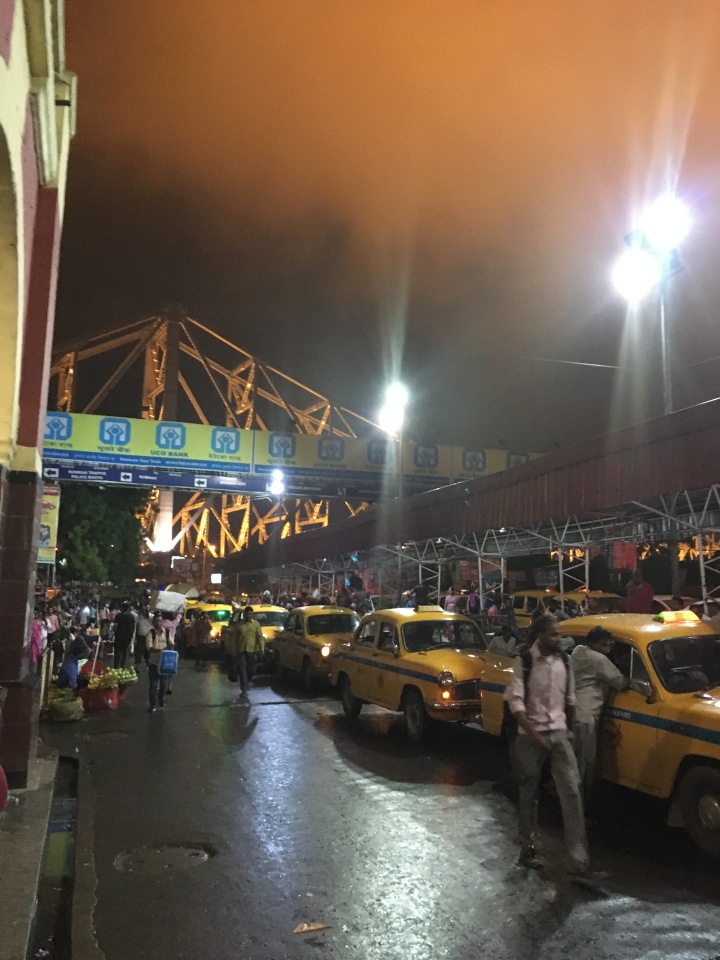
I have never been able to identify the component parts of that distinctive smell that hits you when you step out of the plane into the arms of Kolkata. The humidity is part of it, and it creeps over your skin in a sensual caress of petrol fumes and dust and all the other unidentified particles of the Kolkata air. The moment it hits me something inside me changes, something as unidentifiable as the smell itself. I confess to being disappointed as I settled into one of the city’s new white and blue ‘AC Taxis’. I watched with nostalgic envy as the people before and after me stepped into rattling yellow ambassadors which, in legions, fill Kolkata’s highways like cheerful golden beetles carrying on through the day and the night.
This time it had been a particularly horrible journey. I came alone, having packed up my room and my job in London, not yet knowing where I will live when I start my PhD in an unfamiliar city on my return. Fate (or human frailty) added an extra helping of unexpected personal heartbreak to the precarious inbetweenness of things which, exacerbated by a less than judicious choice of plane literature, had me sobbing like a madwoman all the way. For the first time in my life I felt I have ‘run away’ to Kolkata. But then, where else should I run?
As a number of anthropologists who have gone before me have noticed1, the peoples, locations and social phenomena individual researchers end up working on are not arbitrarily linked to our own needs and life experiences as human beings. It is probably not an accident that my first full dissertation on my research in India revolved around complex notions and experiences of ‘home’, of ‘amar jayga’ [my place], and the peculiar predicament of those who, for whatever reason, don’t feel they can be entirely ‘themselves’ in the place in which they live. It is also no accident, on reflection, that I work with groups of people for whom different aspects of their personal identity compete and conflict, sometimes jarring (or seen to by other people) with Indianness, Indian womanhood or Bengaliness, whatever these things are purported to mean. In England, the country of my birth, I’m exoticised. In India, the country of my cultural heritage, I’m occidentalised. In each place I am called upon to demonstrate the veracity of my claimed identity. Everybody demands to know where I belong. Nobody would like to know that more than me.
Home is a funny concept. It’s tied up with different trappings wherever you go. A typical Euro-American interpretation might conjure up a private, personal space, a safe place where one’s identity can be explored and expressed fully, a relief from the rules of the outside social world. There are other factors. Family. People who are like you. Perhaps, people who you have chosen, and who you have played a part in creating. I still don’t have the answers.
My Kaku and Kakima2 opened the door with as little fuss or surprise as if I’d rolled back home from a day’s work. It’s a mystery to me how, standing in the centre of my uncle’s little flat, I feel comforted by the faded pink and yellow walls that now surround me. Those emotions of despair, uncertainty, pain, stress and pressure are tenderly replaced with a feeling of peace across the breadth and depth of my chest. Here is safety and continuity. My black and white grandparents gaze solemnly at me from their elevated position near our household Hindu shrine. We drink thick, sweet tea around the red lacquered dinner table and live out within a day our familiar patterns of provoking and enjoying each other. Nothing is demanded of me here. My Kaku accepts my scolding him about salt and tobacco consumption as I accept Kakima’s gentle observation that, despite my protests, I need to catch up on forgotten sleep. They know the hesitations in my Bengali speech will disappear with the weekend, and there’s no need to blame it on Englishness. Rather it is to be blamed on being away from here for so long.
There isn’t an exact word for ‘home’ in Bengali. Use of the possessive pronoun amar indicates that sentiment of belonging through ownership. In a few days I’ll be itching for a piano, missing Western Classical Music, and fawning for the ones that I love who aren’t with me. I fill that hole in my arms with my bolster pillow at night. However here my heart steadies me, and as I press my face to the pillow Kolkata’s air slips its arms about me, kisses my hair and holds me tight.

Notes
- Navaro-Yashin, Y., 2012. The Make-Believe Space. Affective Geography in a Postwar Polity, Duke, Londres.
Thiranagama, S., 2011. In my mother’s house: Civil war in Sri Lanka. University of Pennsylvania Press. - Kaku – Father’s younger brother; Kakima – Kaku’s wife
